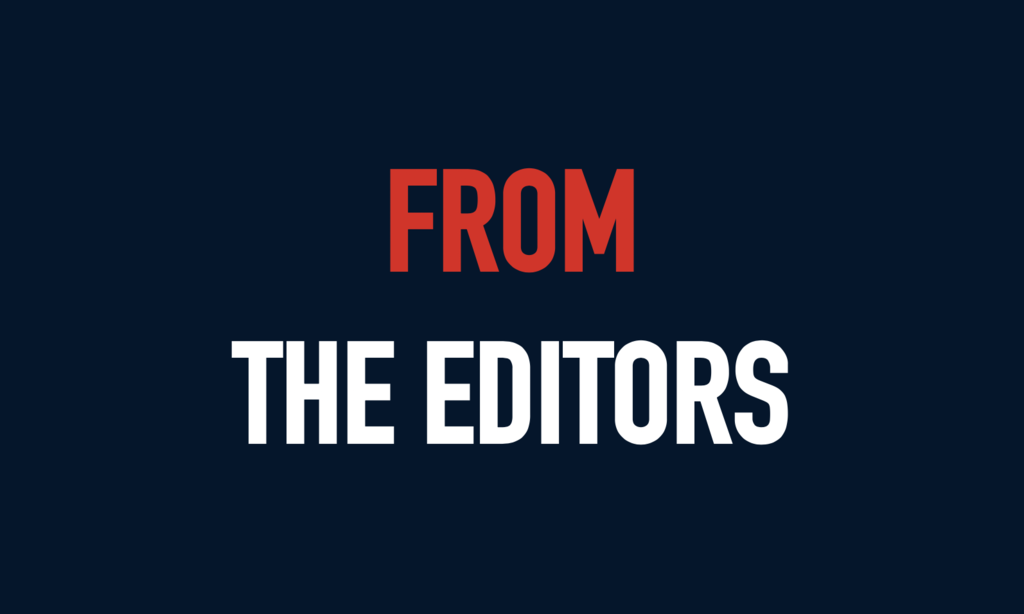This Is Not the End

Whoever wins, we’ve got work to do.
We regret to inform you that this is not, in fact, all going to be over soon.
Those who still need convincing that we are in for a protracted election struggle may refer to our most recent feature and the shockingly brazen developments we’ve been tracking among Democrats for some time.
But in your heart, you probably don’t need convincing. You’ve seen businesses in cities across America fortifying their buildings as best they can against what everyone knows, but no one can say, will be anti-Trump political violence. As Contributing Editor Peachy Keenan has recently affirmed: “despite a likely, even decisive, Trump victory, several potential nightmares await us.”
First, we are all about to go over the waterfall of election week together. But then, after the eerie peace of the initial drop, we will have to start navigating again—and the currents will be even stronger than the rapids that led us here. No, this isn’t going away—not even on inauguration day. Not for a long time after that.
We make this point now because even if Trump wins (as many of us expect), and even if the immediate insurrectionary fallout proves containable, even if we win the inevitable court battles and successfully counter the inevitable disinformation, still: the toxic stew of resentment and disillusionment in which bad actors have been able to thrive—and rule—will not be drained out of our national veins any time soon.
Which means Trump doesn’t have the power to save us on his own. You may recall a little ditty about not putting your faith in princes. Well, don’t put it in normalcy either, or in the lingering holdover of “norms” which have long since obsolesced. The old days are gone—have been for a long time—and they ain’t coming back.
What has been eroded, irrevocably, is something far more profound than any Reaganite consensus or postwar optimism. It is the spirit of civic friendship, based on shared conviction that our life together is worth living, without which—as Lincoln saw the last time our public foundations threatened to crack, and did—nothing can succeed. “He who moulds public sentiment, goes deeper than he who enacts statutes or pronounces decisions,” said Lincoln in 1856. “He makes statutes and decisions possible or impossible to be executed.”
In a republic, those who mold public sentiment will always form for themselves a class apart. If the republic is healthy, they will earn the right to call themselves elites on the basis of a robust meritocracy—they will become, in other words, the natural aristocratic element of republican government.
In our republic, this aristocracy has deteriorated into an oligarchy of artifice—a shameful husk of its ideal self, clinging frantically to power and flailing spasmodically in an ever-more transparent effort to cover up a past riddled with abject failures. Their predictive powers, their supposed insights, their claims to leadership: all of it was a mirage. That is becoming clear as the fantasies they showed us on television dim, flicker, and at last vanish in the light of our new digital age.
Rather than cop to any of this, our ruling classes have taken to browbeating and deceiving the American people, most especially by means of the media and educational system in their control. They hope that if we are demoralized and distracted enough, we will not notice their failures and take steps to unseat them. Since they have also long since grabbed hold of the durable power afforded them by our bureaucratic deep state, it is very, very hard to stop them from ruling over us in the destructive way they now do.
In multi-million-dollar grants and ubiquitous corporate messaging, in federally funded training sessions and in glossy newspaper articles day after day, they tell us that our fellow citizens hate us, and we should hate them back—the reason why hardly matters, since they routinely invent it anew. Americans are racist, classicist, sexist, homophobic: these claims are highly sophisticated, lab-designed acid meant to corrode our attachments to one another and to the regime of our founding documents.
We are going to have to fight back against this, and we have not even begun. Or rather, we have only barely begun: The nomination and election of Donald Trump in 2016 was an effort to repudiate both the Republican and Democrat branches of our decadent elite, if only temporarily and only in the vaguest of terms. But much of the Republican base, no less than the clueless, feckless leadership on the Right, did not understand that all this did was buy us time. Gone are the days when you could wash your hands of politics simply by voting for the politician of your choice, even if that politician is Donald Trump. We ought to have spent the past four years doing the studious, energetic work of organization, building, and re-forming our ideas about policy and law. Instead, we’ve only really begun doing that work in earnest very recently.
Why did it take four years and the heroic efforts of Christopher Rufo to start lancing the deadly, poisonous boil that is critical race theory? Why is it only a few voices, still, who are calling to take meaningful action against social media monopolies which are actively censoring major news outlets in the most unapologetic of ways? Why haven’t we yet salted the earth whence NPR grew?
Because many were ignorant of the real threats we face, and the rest thought they could rely on Trump alone to solve our growing national crisis. But the beast did not retreat quietly into its cave after a stern rebuke. Instead, its stony sleep was vexed to nightmare by the Bad Orange Man, and now it slouches toward the White House to be born.
We can’t say whether, when the dust settles, this Democratic presidential bid—the most shambolic, the most coddled, the most openly radical, the most anti-American in our lifetimes—will be successful. But whether it is or not, our task will be the same: even (read: especially) everyday Americans need to get serious about this fight. The Trump Administration accomplished many things, but perhaps most importantly it revealed how deep the rabbit hole now goes: the fight is both within the federal government and without, and a cancerous corruption has penetrated the core of many of our political and cultural institutions.
What we are up against now is not just a 24/7 propaganda machine dedicated to enforcing recondite woke doctrines inside and outside of our hearts and minds. Our enemies have moved beyond that to visions of a virtualized world in which good jobs, big families, and strong churches are zapped away, where peons crowd into pods and hook up to holograms of censored news and uncensored porn. We are going to have to resist all that with everything we have, and fast.
If we are chased out of political power then we are going to have to band together in local groups to win what victories we can while we plan for 2022. We are going to have to protect one another from economic and physical predations which will be empowered not only by the state but also by previously undreamt-of technology. We will need to build powerful activist and legal organizations. We will need to begin creating, seeking out, and using digital technology that empowers and protects us instead of degrading and enslaving us. We will need to build media organizations that can withstand heightened censorship and that will do real damage to the legacy institutions—not just as rebellious upstarts, but as serious contenders for, and ultimate winners of, control over the national narrative.
On the other hand, if a Trump victory buys us time, we are going to have to do all of the above and more. Making things right will require all of us to take real and concrete action, however we each are able. Most of all we are going to have to resist imagining, as we fondly did last time, that we have won. We won’t have won anything except another shot at saving the republic. It will take a lot of hard work and a supremely indulgent God to afford us that shot. If we get it, we’d better not waste it.
The American Mind presents a range of perspectives. Views are writers’ own and do not necessarily represent those of The Claremont Institute.
The American Mind is a publication of the Claremont Institute, a non-profit 501(c)(3) organization, dedicated to restoring the principles of the American Founding to their rightful, preeminent authority in our national life. Interested in supporting our work? Gifts to the Claremont Institute are tax-deductible.
The case of CNN.
The minor prophets of conservatism may be past their sell-by date.






